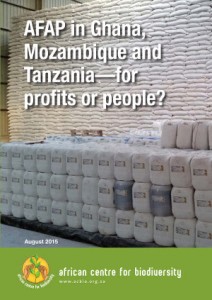From African Centre for Biodiversity, 31.8.15
The chemical fertiliser push in Africa and its implications for smallholder farmers is not receiving enough attention in current discourses concerning Green Revolution policies and practises in Africa. Yet chemical fertilisers are big business on the continent, where its adoption is strongly supported by African governments through subsidy schemes and regional organisations such as NEPAD, the African Union and COMESA, and international donor organisations such as USAID, DfiD, the FAO and the Soros Foundation.
The African Centre for Biodiversity has been tracking this issue for a while now and has today released a further research report on the issue, titled, “AFAP in Ghana, Mozambique and Tanzania, for Profits or People”. Ghana, Mozambique and Tanzania are key target breadbasket countries for the African Fertilizer Agribusiness Partnership (AFAP), one of the main beneficiaries of the Gates Foundation-funded Alliance for a Green Revolution in Africa (AGRA). These three African countries afford easy access to neigbouring states, have ports to facilitate fertiliser imports and have amenable regulatory and policy environments.
Acting both as its own agent through the agribusiness partnership contracts, which focus primarily on building warehouse capacity, extending supply and credit guarantees to private companies and supporting extraction of raw materials – such as rock phosphate – and as an implementing partner for major international development agencies, AFAP has become a significant player in the policy space. It is able to further its agenda of increasing private-sector trade in fertilisers on the continent under the guise of bolstering food security or livelihoods of the rural poor. The organisation’s efforts align with the Green Revolution push in Africa to move farmers away from traditional systems to commercial ones reliant on high levels of external inputs (seeds, fertilisers, pesticides, etc.). As most farmers are too poor to afford these inputs, support is often given in the form of publicly funded subsidies or credit. By providing the support of ‘real’ finance to private-sector interests through matching grants and ‘credit’ finance to small-scale farmers who are unable to purchase expensive inputs, such as fertiliser, without loans or subsidies, AFAP exacerbates and entrenches existing economic inequalities and ecological adverse effects.
Download the 1,4Mb PDF report.
